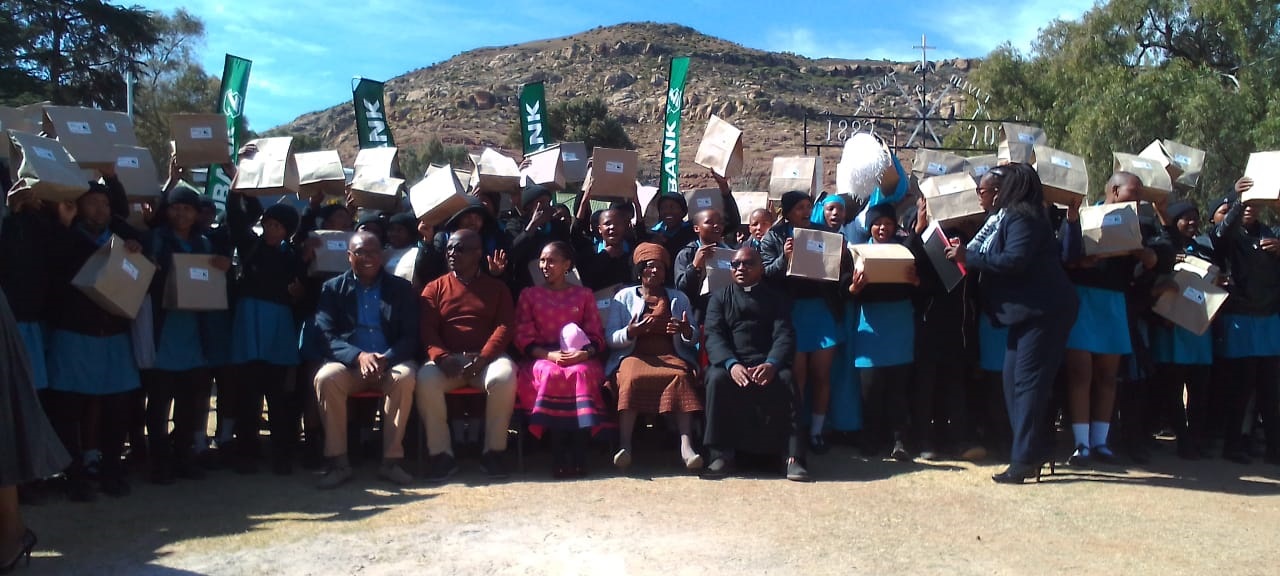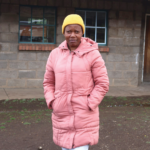Ntsoaki Motaung
Her Majesty Queen ‘Masenate Mohato Seeiso on Tuesday donated sanitary pads to about 200 girls at Roulin High School in Mafeteng through the Hlokomela Banana initiative.
This was done with the support from Nedbank Lesotho, Blue Ribbon and Lil-lets company.
Speaking at the event, Queen ‘Masenate indicated that there was a need for the government to prioritise and recognise menstrual health and hygiene issues as an emergency.
“By being treated as an emergency, we mean that sanitary towels should be provided to schools by the Ministry of Education as part of stationary or equipment delivered to schools regularly,†the Queen said.
She added; “This will help disadvantaged students access the pads freely and would not have to miss school when they are on their periods.â€
Some studies have found that girls who do not have enough sanitary products for every period are more likely to miss school.
The Queen indicated that there were wash clubs established in schools which provide education about menstrual health and hygiene.
These clubs, she added, “do not leave a boy child outâ€.
She said wash clubs help to do away with some discriminatory, sociocultural norms, taboos, stigmas and other harmful practices.
The Queen also pleaded with girls at Roulin High School not to engage in early marriages so that they can be in school until they completed.
Hlokomela Banana is an initiative of the Queen’s National Trust Fund.
The initiative is committed to providing sanitary products to all female secondary and high school learners in Lesotho. It was launched in 2017.
Speaking at the celebration of Menstrual Health and Hygiene Day (MH Day) earlier this year, she said that some women and girls have no access to sanitary pads, clean water and toilets at school for privacy.
“Let us all remove the obstacles, identify opportunities and strengthen our efforts to accelerate access to menstrual health and hygiene services in Lesotho,†she said.
MH Day is observed on May 28 each year. This year it coincided with the International Day of Action for Women’s Health 2022.
The day highlights the importance of menstrual care and raises awareness about the social issues faced by women during menstruation and those who do not have access to sanitary products.
Phehello Phera from the Ministry of Health on Tuesday stated that there were still barriers to menstrual health and hygiene.
These, Phera said, include that about 20 percent of the population does not have access to improved water facilities while 27 percent with unimproved sanitation facilities.
“The data shows that half of the schools have no water supply and even worse there are no sanitation facilities as well as menstrual health management rules,†he said.
Summary
- Speaking at the event, Queen ‘Masenate indicated that there was a need for the government to prioritise and recognise menstrual health and hygiene issues as an emergency.
- “By being treated as an emergency, we mean that sanitary towels should be provided to schools by the Ministry of Education as part of stationary or equipment delivered to schools regularly,†the Queen said.
- Speaking at the celebration of Menstrual Health and Hygiene Day (MH Day) earlier this year, she said that some women and girls have no access to sanitary pads, clean water and toilets at school for privacy.

Your Trusted Source for News and Insights in Lesotho!
At Newsday Media, we are passionate about delivering accurate, timely, and engaging news and multimedia content to our diverse audience. Founded with the vision of revolutionizing the media landscape in Lesotho, we have grown into a leading hybrid media company that blends traditional journalism with innovative digital platforms.









